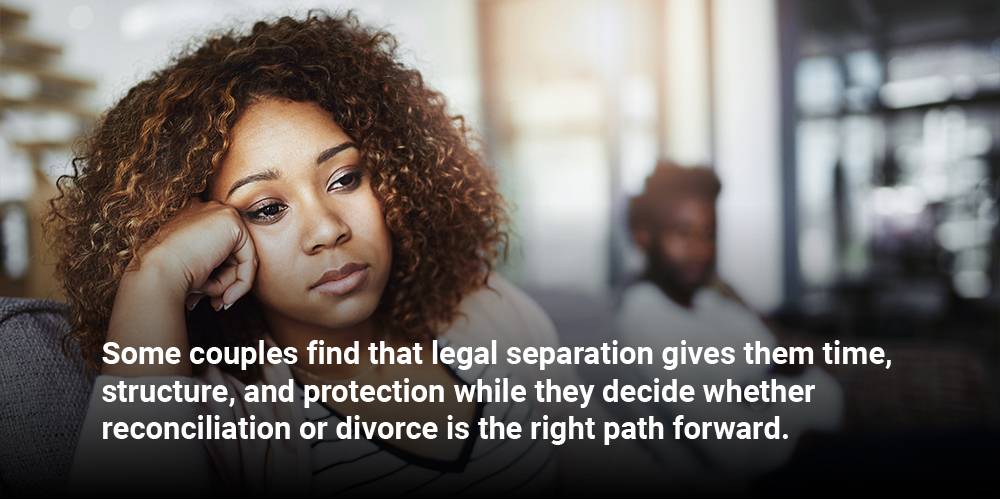Why Some Couples Choose Legal Separation Over Divorce
 Filing for divorce is one of the most serious and final decisions most people make in their lives. Even when spouses realize that they are unhappy together, they may not be totally sure that they want to end their marriage completely. For those who are unsure about whether divorce is the right step, legal separation can serve as a meaningful alternative.
Filing for divorce is one of the most serious and final decisions most people make in their lives. Even when spouses realize that they are unhappy together, they may not be totally sure that they want to end their marriage completely. For those who are unsure about whether divorce is the right step, legal separation can serve as a meaningful alternative.
In Illinois, legal separation allows a couple to live apart and set up boundaries while technically staying married. This option gives people time and structure to decide whether reconciliation is possible or whether a divorce should eventually follow. Some people simply stay legally separated forever.
If you are wondering whether legal separation is a path you may be interested in, contact our DuPage County family lawyers today.
What Is Legal Separation in Illinois?
Under Illinois law (750 ILCS 5/402), legal separation allows married spouses to live apart. Separated spouses can ask for a court order addressing issues such as property division, parenting responsibilities, child support, and alimony. Unlike divorce, however, legal separation does not end the marriage. A couple remains legally married and cannot remarry unless they later get officially divorced.
To qualify for a legal separation in Illinois, at least one spouse must live in the state, and the couple must be living separately when the petition is filed. Unlike in a divorce, Illinois does not require proof of irreconcilable differences or any other "grounds" to get a legal separation.
How Does Legal Separation Work?
Legal separation can closely resemble divorce in terms of procedure, though the outcome is different. One spouse files a petition for legal separation in the circuit court of the county where either spouse lives. The petition asks the court to issue a judgment on key issues such as property, parenting, and financial support.
If the couple agrees on the terms of their legal separation, the court can approve a separation agreement. If the couple cannot agree, the court will make decisions based on Illinois law and the evidence.
Why Do Some Couples Choose Legal Separation Instead of Divorce?
Time and Space to Decide About the Marriage
Some couples are uncertain about whether their relationship can be repaired. A legal separation allows them to take a structured "pause" without the finality of divorce. Time apart sometimes provides perspective and allows both spouses to focus on what they really want.
Religious or Cultural Reasons
For some people, divorce goes against their deeply held religious or cultural values. Legal separation provides a way to live apart and have independent lives without violating their beliefs.
Finances or Insurance
Health insurance is one of the most common reasons couples choose legal separation. In many cases, a spouse can continue to receive insurance through their partner’s employer-sponsored plan. Once divorced, that coverage usually ends.
A legal separation can also make sense if one spouse depends on the other’s income or retirement benefits but does not yet want to divide those assets. For example, staying married may allow one spouse to qualify for Social Security spousal benefits or have access to certain pensions.
Protection for Property and Parental Rights
Couples can live apart at any time without court involvement, but doing so without a court order can leave everyone without important protections. For example, without a legal separation, one spouse could empty shared bank accounts or take minor children out of state.
A court-approved separation agreement can address these issues, defining:
-
How marital property and debts will be divided or managed
-
Who will have parenting time (visitation) and decision-making responsibilities (custody)
-
How child support or spousal maintenance (alimony) will be handled
Illinois law allows courts to order alimony in a separation just as it would in a divorce.
Staying Officially Married
Some couples prefer to remain legally married for personal or emotional reasons even though they live apart. They may feel that divorce sends a message they are not ready for. They may simply want to maintain marital status for religious, cultural, or familial stability.
Legal separation strikes a balance between independence and connection. It allows spouses to organize their finances and lives separately without cutting legal ties.
Why Legal Separation Is Less Common than Divorce
While legal separation can be beneficial for some people, it is not a long-term solution for most couples. Because the process is similar to divorce, it involves the same legal fees, paperwork, and court appearances. If the couple later decides to divorce, they will need to file a whole new case.
In most situations, couples who are certain that the marriage is over simply get a divorce rather than taking the in-between step of legal separation. Still, for those who need it, the option remains available and can provide valuable protection and structure.
How Does Legal Separation Affect Parenting?
A legal separation can include a parenting plan that sets in place parental responsibilities and parenting time arrangements. The court will prioritize the best interests of the child, just as it would in a divorce. When this is done well, it can give kids and parents a clear structure for custody, visitation, and support.
Can a Legal Separation Be Converted Into a Divorce?
At any time after a legal separation is granted, either spouse can file for divorce. They must file a new petition for dissolution of marriage just like any other married couple would. However, having a legal separation in place can make the process faster and smoother.
Many of the issues — including property division, parenting time, and support — will already have been resolved in the separation case. If both spouses still agree to those terms, the court can incorporate them into the divorce judgment. This can save everyone valuable time and money. This flexibility allows couples to take one step at a time; first separating, then deciding later whether divorce is the right choice.
If circumstances have changed, however, either spouse can ask the court to modify those arrangements before the divorce is finalized. In short, a legal separation provides a framework that can later serve as the foundation for a divorce, but it does not automatically become one.

Call a St. Charles, IL Family Lawyer Today
You can explore what legal separation might look like for you with the Kane County legal separation attorneys at Goostree Law Group. We listen to each client carefully so we can make recommendations based on each client’s values and needs.
Our firm provides free consultations and can guide you through every aspect of your separation or divorce. To learn more or schedule a consultation, call Goostree Law Group at 630-584-4800 today.












